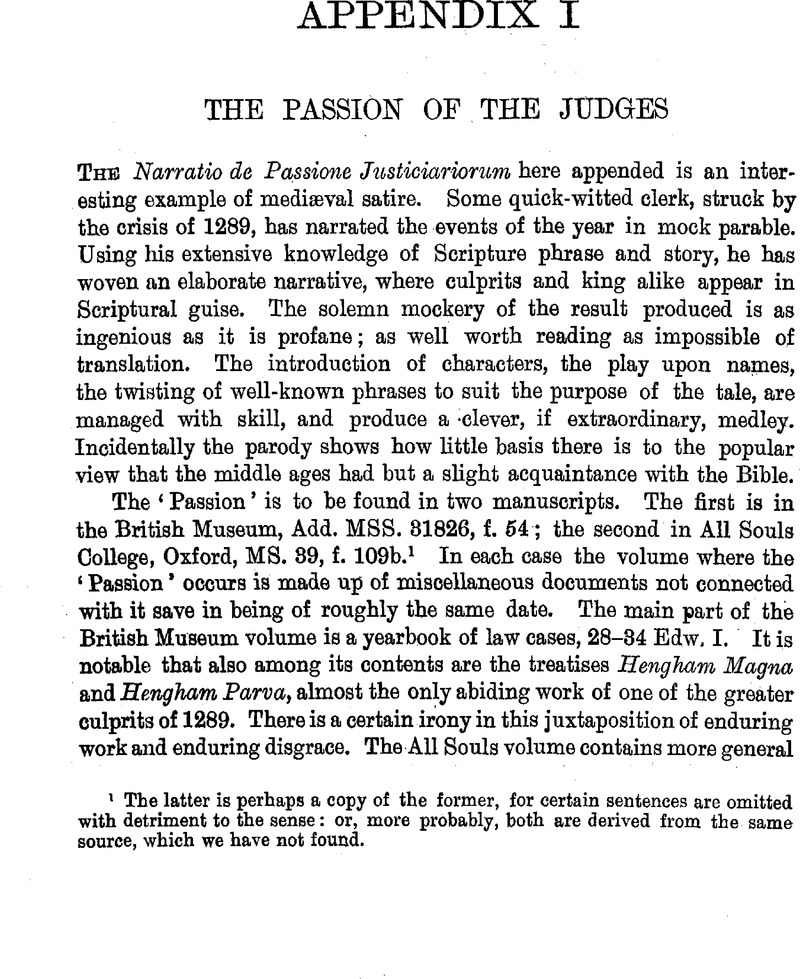No CrossRef data available.
Article contents
Appendix I: The Passion of the Judges
Published online by Cambridge University Press: 24 December 2009
Abstract

- Type
- Appendices
- Information
- Copyright
- Copyright © Royal Historical Society 1906
References
page 93 note 1 The latter is perhaps a copy of the former, for certain sentences are omitted with detriment to the sense: or, more probably, both are derived from the same source, which we have not found.
page 94 note 1 Wright, and Halliwell, , Reliquiœ Antiquœ (1843), ii. 58, 208Google Scholar. Cf. for other references Gröber, , Grundriss der romanischen Philologie (1893), ii. 1, 323Google Scholar.
page 94 note 2 Notice of a Manuscript of the latter part of the fourteenth century entitled Passio Scotorum Perjuratorum, by the Marquess of Bute, in Proceedings of the Society of Antiquaries of Scotland, vol. xix. pp. 166 et sq. (1885). Our attention has been called to this by the kindness of Mr. Henry Gough, who discovered the Passio Scotorum in a MS. now deposited in the Public Library at Reigate Church. It is of contemporary date, and has, curiously enough, been closely copied in two versions at least of Flores Historiarum (cf. Flores, iii. 128–136 and 322–325, Rolls Ser.).
page 94 note 3 Adam of Usk's Chronicle, ed. SirThompson, E. Maunde (1904), pp. 106, 107Google Scholar.
page 95 note 1 MS. B Passio ministrorum domini Edwardi regis Anglie secundum opera sua.
page 95 note 2 MS. A turbine.
page 95 note 3 MS. B Edwardus rex.
page 95 note 4 MS. A reverti
page 95 note 5 MS. B sibi.
page 95 note 6 MS. B proximos.
page 95 note 7 MS. B sedent.
page 95 note 8 MS. B interficiant.
page 95 note 9 MS. B regem.
page 95 note 10 MS. B quod.
page 95 note 11 MS. B autem.
page 95 note 12 M.S. A dubitabant.
page 95 note 13 MS. A qui dicitur.
page 95 note 14 Thomas de Weyland, who fled on the King's arrival to Babwell (fons Babilonis), a house of the friars minor, near Bury St. Edmunds. There he assumed the friar's habit (vestimenta ovium), confessing that he had been a subdeacon in the past, before his marriage, Guards under Bobert Malet surrounded the buildings, preventing the friars from procuring food for their visitor, and allowing them to leave, but not to re-enter the house. Compare Peekham's letter in favour of the fugitive, Registrum Epistolarum Joharmis Peckham, iii. 968, Bolls Series.
page 96 note 1 MS. A inserts ‘ omnia.’
page 96 note 2 MS. A inserts ‘ ministris.’
page 96 note 3 MS. B omits ‘ nunc.’
page 96 note 4 MS. B omits ‘ meis.’
page 96 note 5 MS. A desertibus.
page 96 note 6 MS. B omits ‘ qui fuerunt.’
page 96 note 7 MS. B leones paratos ad predictam.
page 96 note 8 MS. A oculi.
page 96 note 9 MS. B inserts ‘ suis.’
page 96 note 10 MS. B fuerant.
page 96 note 11 MSS. erat.
page 96 note 12 MS. B. dixit.
page 96 note 13 Omitted in MS. B.
page 96 note 14 MS. B eam.
page 96 note 15 Omitted in MS. B.
page 96 note 16 MS. B liberabit.
page 96 note 17 Adam de Stratton.
page 96 note 18 A reference to his previous conviction in 1279 for forgery and fraud, at the suit of the abbot and monastery of Quarr. Stratton's disgrace on this occasion was only brief, for within the year all offices were restored to him. See Red Book of the Exchequer, Introduction iii. ccxx.–xxii.
page 96 note 19 Omitted in MS. B.
page 97 note 1 MS. B eam.
page 97 note 2 Omitted in MS. B.
page 97 note 3 MS. A locum.
page 97 note 4 MS. B inserts ‘ hoc.’
page 97 note 5 MS. B ei.
page 97 note 6 MS. B omits ‘ rex,’ inserts ‘ eis.’
page 97 note 7 MS. B vestra.
page 97 note 8 MS. B predicto.
page 97 note 9 This is the response to the invitation given to complainants by the writ to the sheriffs of October 13, 1289 (Fœdera, i. pt. 2, p. 715).
page 97 note 10 MS. B omits ‘ primos.’
page 97 note 11 MS. A vindictam.
page 97 note 12 MS. B omits ‘ se.’
page 97 note 13 MS. B inserts ‘ postmodum.’
page 97 note 14 MS. A numeravi.
page 97 note 15 MS. B eas.
page 97 note 16 MS. B omits ‘ et.’
page 97 note 17 MS. B ea.
page 97 note 18 MS. B tertius.
page 97 note 19 MS. B eam.
page 97 note 20 MS. B nuntiabant, omits ‘ hec.’
page 97 note 21 MS. B venire et.
page 97 note 22 MS. B omits ‘ huc.’
page 98 note 1 MS. B inserts ‘ est.’
page 98 note 2 MS. B inserts ‘ est.’
page 98 note 3 MS. B inserts ‘ si.’
page 98 note 4 MS. A nostri.
page 98 note 5 MS. B inserts ‘ rex.’
page 98 note 6 MS. B. omits from this point to ‘ tempore.’
page 98 note 7 MS. B inserts ‘ ibi.’
page 98 note 8 MS. B illis.
page 98 note 9 MS. A intrate.
page 98 note 10 MS. B inserts ‘ Dixerunt ministri.’
page 98 note 11 MS. B. inserts ‘ tunc.’
page 98 note 12 MS. B secundum.
page 98 note 13 Weyland, Brompton, Lovetot, Leicester, Littlebury and Stratton are left in their abbreviated forms for convenience of scansion.
page 98 note 14 ‘ The castle (in chess, still also called the rook) is taken away and the board is none the worse.’ For this and certain emendations we are indebted to Mr. A. G. Little.
page 98 note 15 MS. ne.
page 99 note 1 MS. funere vincti.
page 99 note 2 MS. est.




